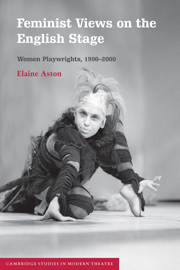Book contents
- Frontmatter
- Contents
- Acknowledgements
- 1 A feminist view on the 1990s
- 2 Telling feminist tales: Caryl Churchill
- 3 Saying no to Daddy: child sexual abuse, the ‘big hysteria’
- 4 Girl power, the new feminism?
- 5 Sarah Kane: the ‘bad girl of our stage’?
- 6 Performing identities
- 7 Feminist connections to a multicultural ‘scene’
- 8 Feminism past, and future? Timberlake Wertenbaker
- 9 Tales for the twenty-first century: final reflections
- Notes
- Bibliography
- Index
4 - Girl power, the new feminism?
Published online by Cambridge University Press: 22 September 2009
- Frontmatter
- Contents
- Acknowledgements
- 1 A feminist view on the 1990s
- 2 Telling feminist tales: Caryl Churchill
- 3 Saying no to Daddy: child sexual abuse, the ‘big hysteria’
- 4 Girl power, the new feminism?
- 5 Sarah Kane: the ‘bad girl of our stage’?
- 6 Performing identities
- 7 Feminist connections to a multicultural ‘scene’
- 8 Feminism past, and future? Timberlake Wertenbaker
- 9 Tales for the twenty-first century: final reflections
- Notes
- Bibliography
- Index
Summary
Feminism: ‘an adventure story’ for girls
How can feminism interest young women today? Why should young women be interested in a movement that generally has such a bad press and is perceived to be ‘over’? These are questions feminism currently faces. Researching past feminist literatures and publications, however, I was reminded that getting young women involved in feminism was also a problem that second-wave feminists faced. In her introduction to Feminism for Girls: An Adventure Story published in 1981, Angela McRobbie explains how, given the media depiction of feminists as ‘dull, boring, and quite united in our lack of humour’, it needs ‘an adventurous girl to give feminism more than a second thought’. In the 1970s McRobbie introduced her experience of and involvement with the lives of working-class girls as a research topic at the Birmingham Centre for Contemporary Cultural Studies (CCCS). Feminism as ‘an adventure story’, while an unlikely proposition, was one that promised the young women that McRobbie met and worked with a ‘new kind of adventure’, based on mutual (cross-generational) support, confidence, and knowledge about women's rights, situations, politics, and bodies.
The idea of feminism as ‘an adventure story’ for girls was also adopted by second-wave feminist theatre-making. The first productions by The Women's Theatre Group, for example, consisted of devised shows specifically aimed at a schools' audience.
- Type
- Chapter
- Information
- Feminist Views on the English StageWomen Playwrights, 1990–2000, pp. 59 - 76Publisher: Cambridge University PressPrint publication year: 2003

